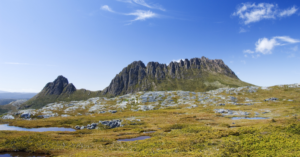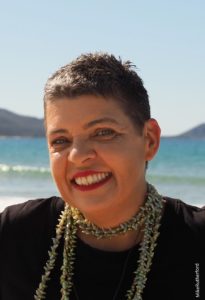Regions are more than the terrestrial or the aquatic for Indigenous and First Peoples; Indigenous regions comprise the more-than-human spaces of night skies and ancestral beings and the cultural practices that imbue them with knowledge and wisdom. Regions encompass so much more than just Western thoughts and processes, yet Indigenous regions are not visible in local or global planning, research, funding and implementation.

Cradle Mountain, Tasmania, Australia, St. Clair National Park – Tasmanian Wilderness World Heritage Area © Christian Kober Shutterstock
Western regional thinking has required, to succeed, the erasure of Indigenous boundaries, sovereign territories and places of connection and belonging. In colonizing our territories and areas, and with it our intellectual scholarship that values a holistic approach, Western societies have long denied themselves the possibility and potential for positive, inclusive structures of Indigenous evaluation and impact indicators. By this, the cultural and spiritual influences on our lives are more than an optional add-on to siloes of, for example, economic or scientific motives that seemingly drive so much of Western cultures.
Local, Indigenous-led conservation in Tasmania, Australia
Land management is a case in point, particularly protected and conserved areas such as national parks. I am a trawlwulwuy woman from tebrakunna country, north-east Tasmania, Australia, and our homelands have been taken from us under colonization. Half of those lands are now managed as protected and conserved areas including the Tasmanian Wilderness World Heritage Area, or TWWHA country. TWWHA country is listed for seven natural and cultural criteria of Outstanding Universal Value, yet the sole government management focus has long been on the natural values.
I care for TWWHA country as my ancestors have done for the past 40,000 years, albeit with less customary knowledge or rights to do so. Yet I have also been able to take advantage of the spaces for change that my peers, Elders, communities and allies have carved out for us in conservation over the decades.
In the last five years I have helped to create a framework for joint management of TWWHA country, the first time that a national park has been considered more than just property of the Crown in Tasmania. This Indigenous-led research and subsequent policy development opened international doors for me to have a broader view of Indigenous Peoples conditions in conservation.
International conservation best practices and Indigenous Peoples
The International Union for the Conservation of Nature (IUCN) has recently begun to make strong statements of formal support for Indigenous Peoples ways of knowing, seeing and relating with First Nations territories of life. In January 2021 the IUCN released their 32nd international standard for Best Practice Guideline for the global management and governance of protected and conserved areas. This Guideline, the Cultural and spiritual significance of nature, is an inclusive volume that looks to embed Indigenous knowledges and practices, among others, as a desirable form of recognition and conservation of nature. The centering of connections people have with nature marks out this Guideline as inspiring and respectful and significant to conserve.
I am fortunate enough to have been invited to contribute an editorial role on the Guideline and bring Indigenous Australian knowledges to the international conservation table. I believe that the cultural and spiritual significance we associate with our places and territories of life are a region that requires attention. What constitutes a ‘region’ for Indigenous peoples is an important question that is little asked and seldom considered. Indigenous peoples are at the forefront of leading change in how we value the earth. Our Peoples and knowledges can assist in exploding out the definitions of regions and regional development for mutual benefit and greater research satisfaction.

Dr Emma Lee is an Aboriginal and Torres Strait Islander Research Fellow, RegionxLink, Centre for Social Impact, Swinburne University of Technology. Since 2015, she has, in her home state of Tasmania, established a market for cultural fisheries, while being a key architect to gain state constitutional recognition and a whole-of-government strategy that reimagines social justice as regional development for Aboriginal benefit.
Are you currently involved with regional research, policy, and development? The Regional Studies Association is accepting articles for their online blog. For more information, contact the Blog Editor at rsablog@regionalstudies.org.